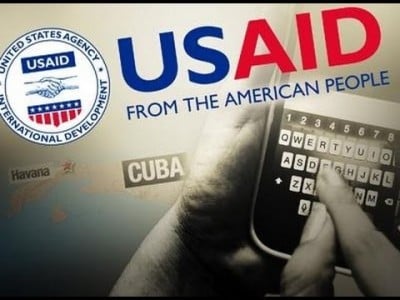Social Media and the Destabilization of Cuba: USAID’s Secret “Cuban Twitter” Intended to Stir Unrest

Reported by the Associated Press, Washington has created a “Cuban Twitter” with a view to creating social unrest. The ultimate objective of this and other initiatives is to demonize and weaken the Cuban Communist government.
This program should be seen as part of Washington’s Worldwide actions to implement regime change in countries which do not abide by U.S. diktats. The social media program entitled ZunZuneo was part of a secret plan under the auspices of the United States Agency for International Development (USAID):
In July 2010, Joe McSpedon, a U.S. government official, flew to Barcelona to put the final touches on a secret plan to build a social media project aimed at undermining Cuba’s communist government.
McSpedon and his team of high-tech contractors had come in from Costa Rica and Nicaragua, Washington and Denver. Their mission: to launch a messaging network that could reach hundreds of thousands of Cubans. To hide the network from the Cuban government, they would set up a byzantine system of front companies using a Cayman Islands bank account, and recruit unsuspecting executives who would not be told of the company’s ties to the U.S. government.
The project was financed by USAID as part of a “democracy” building agenda. USAID is known to have routine contacts with the CIA. The U.S. Agency for International Development was essentially a front for a carefully planned intelligence operation:
Documents show the U.S. government planned to build a subscriber base through “non-controversial content”: news messages on soccer, music, and hurricane updates. Later when the network reached a critical mass of subscribers, perhaps hundreds of thousands, operators would introduce political content aimed at inspiring Cubans to organize “smart mobs” — mass gatherings called at a moment’s notice that might trigger a Cuban Spring, or, as one USAID document put it, “renegotiate the balance of power between the state and society.”
At its peak, the project drew in more than 40,000 Cubans to share news and exchange opinions. But its subscribers were never aware it was created by the U.S. government, or that American contractors were gathering their private data in the hope that it might be used for political purposes.
The Cuban media reacted to the ZunZuneo twitter project by pointing to a continuous process of covert operations directed against Cuba since the 1961 Bay of Pigs failed invasion. It is worth noting that Cuba has been under a US sanctions regime since 1962.
The ZunZuneo initiative is viewed by the Cuba government as part of a process of non-conventional warfare (including cyber warfare) waged against countries (e.g. Venezuela, Ukraine) which do not abide by Washington’s demands.
The destabilization of Cuba has been on drawing board of the US State Department and the CIA since the 1960s.
Actions directed against Cuba are undertaken through the US Agency for International Development (USAID), the National Endowment for Democracy (NED) and the Economic Support Fund (ESF) of the US State Department.
Other organizations providing funding and operating in tandem with USAID and the NED are Freedom House, The Center for a Free Cuba, The Institute for Democracy in Cuba, the Cuban Dissidence Task Group, the International Republican Institute (IRI).
Documented by Eva Golinger, USAID channels these destabilizing programs through an “Office for Transition Initiatives (OTI) for Cuba with a view to engaging “in work with youths” and in the “independent initiatives of the mass media,” According to Golinger:
The OTI handles liquid funds in dollars “in very large quantities, without having to go through a lot of review or accountability at the US Congress.”
There are two major points of difference between traditional warfare and irregular warfare: objectives and tactics, she pointed out.
Irregular warfare is aimed at controlling the civilian population and neutralizing the State, and its main tactic is ‘counterinsurgency,’ which is the use of indirect and asymmetric techniques, such as subversion, infiltration, psychological operations, cultural penetration and military deceit.” (Voltaire Net, August 9, 2009)
According to Prensa Latina, “Zun Zuneo joins an extensive list of secret anti-Cuban operations” as well as numerous plots to assassinate Fidel Castro.
The Cuban government of Raul Castro has requested the US to cease these actions:
Prensa Latina recalled a 1 January speech in which President Raúl Castro warned of “attempts to subtly introduce platforms for neoliberal thought and for the restoration of neocolonial capitalism”.
“Castro’s denunciations of the US government’s destabilizing attempts against Cuba were corroborated by today’s revelation of a plan to push Cuban youth toward the counterrevolution, with the participation of a US agency,” Prensa Latina said. (Guardian, April 4, 2014)
The existence of this program was known to the Cuban authorities prior to the publication of the AP report. According to Josefina Vidal, director of U.S. affairs at Cuba’s Foreign Ministry, in a official statement, the ZunZuneo program:
“shows once again that the United States government has not renounced its plans of subversion against Cuba, which have as their aim the creation of situations of destabilization in our country to create changes in the public order and toward which it continues to devote multimillion-dollar budgets each year. The government of the United States must respect international law and the goals and principles of the United Nations charter and, therefore, cease its illegal and clandestine actions against Cuba, which are rejected by the Cuban people and international public opinion”
The secret Cuba twitter will be the object of debate at the US Congress in a session of the House Oversight Subcommittee.

